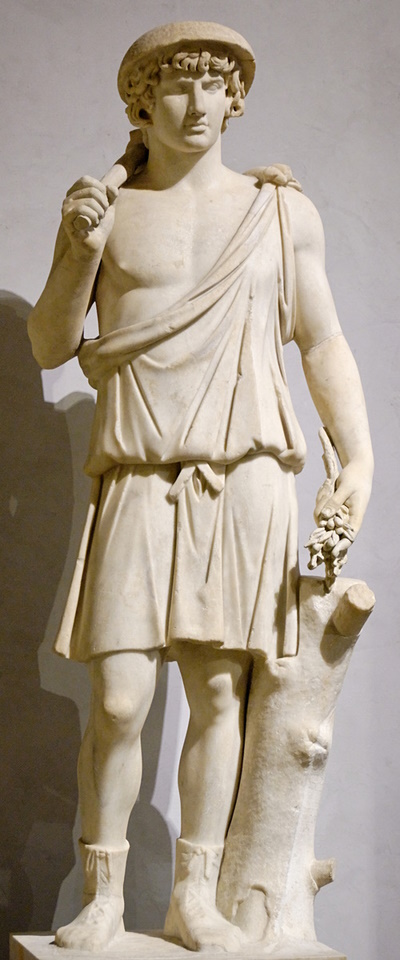“That man invented the riddled hive with its rows of cells, and made a settled place for the labours of the wandering bees, which flit from flower to flower over the meadows and flutter on clusters of fine-fruiting plants, sucking dew from the top with the tips of their lips. He covered every limb from toenails to hair with a closewoven wrap of linen, to defend him from the formidable stings of the battling bees, and with the cunning trick of smothering smoke he tamed their malice. He shook in the air a torch to threaten the hive-loving bee, and lifting a pair of metal plates, he clapt the two together with rattling hands over the brood in the skep, while they buzzed and humblebumbled in ceaseless din; then cutting off the covering of wax with its manypointed cells, he emptied from the comb its gleaming treasure of honeydripping increase.” –Nonnus, Dionysiaca 5. 212

Aristaeus is a pretty big deal as far as apiarists are concerned, what with being none other than the Greek God of Beekeeping. As I mentioned in the Friar Tuck review, being a legendary figure elevates a fictional character to another level, and the Greek Gods start at that level. Aristaeus may not have as many stories as Heracles or Odysseus, but you can be sure that there are many stories about Aristaeus that go together or contradict. Even for such a relatively minor figure of myth, I can’t cover them all. But we can look at the basics.
Aristaeus is the son of Apollo, the god, and Cyrene, a nymph or mortal princess depending what tale you’re listening to. In any case, Aristaeus may have been born mortal, but was elevated to godhood either because of his family or because of his skill making honey. What we do know is that he learned to keep bees alongside a lot of other skills such as herblore and cheesemaking, because even the best Beekeepers know that it pays to expand one’s knowledge base. But the thing about Aristaeus is that he shared his knowledge with humans. He travelled the world educating mortals and teaching them things that might help them get by. This sort of Promethean kindness goes a long way with me.
But there are things I don’t care for when it comes to our man here. I’ve read several accounts that describe him “enslaving” the bees, and I don’t like that, so I have to chalk it up to a translation thing. More significant is that, in some tellings, he had a role in the death Eurydice. Apparently he was enamoured by her and “chased her” which led to her running into a snake pit and getting bitten. I don’t like the idea of anybody actually physically chasing someone like that because it makes you wonder what he intended to do if he caught her. He may not have been intentionally responsible for her death, but geez. We do have stories that follow up on this event. The gods decide to punish Aristaeus for his role in her death and they kill off all his bees. To get them back he has to perform a lot of sacrifices and do rituals to make it up to Eurydice and Orpheus. He does all this and is apparently forgiven because he gets his bees back. As it is presented, he does this for his bees rather than because he actually feels bad about what he’s done. But that’s the thing about legendary figures, we don’t get much of their interiority unless someone rights that story. Anyway, none of this comes up in Hadestown, so I don’t even really need to consider canonical if I don’t want to.
There’s more to the guy. I’ve seen at least one account of him solving a murder, which is a big Beekeeping plus for me. He eventually marries a princess named Autonoë and from what I can see their marriage is above average for Greek gods, if we ignore what happened to one of his children. Oh, and his name literally means “The Best”.

Five Honeycombs out of Five. He’s a literal God of Beekeeping. I feel like I couldn’t go any lower than this.

